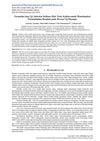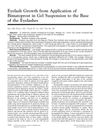 7 citations,
December 2019 in “American Journal of Clinical Dermatology”
7 citations,
December 2019 in “American Journal of Clinical Dermatology” Topical therapies show promise for hair loss and acne treatment with minimal side effects.
 40 citations,
November 2017 in “International journal of nanomedicine”
40 citations,
November 2017 in “International journal of nanomedicine” DA liposomes with chloramphenicol effectively target hair follicles and combat MRSA with minimal skin toxicity.
 23 citations,
September 2018 in “Dermatologic Therapy”
23 citations,
September 2018 in “Dermatologic Therapy” Microneedling is a safe and effective way to improve various skin conditions with minimal side effects.
 17 citations,
November 2002 in “Australasian Journal of Dermatology”
17 citations,
November 2002 in “Australasian Journal of Dermatology” Saw palmetto causes allergic reaction, minoxidil causes skin irritation; use cautiously for hair loss.
 January 2023 in “Postępy Dermatologii i Alergologii”
January 2023 in “Postępy Dermatologii i Alergologii” Azelaic acid treats acne, rosacea, and hyperpigmentation with minimal side effects.
 41 citations,
April 2012 in “Journal of The European Academy of Dermatology and Venereology”
41 citations,
April 2012 in “Journal of The European Academy of Dermatology and Venereology” Dutasteride-containing mesotherapy effectively treats female hair loss, improving density and thickness with minimal side effects.
 38 citations,
November 2012 in “Expert Opinion on Drug Safety”
38 citations,
November 2012 in “Expert Opinion on Drug Safety” Common acne treatments can cause various side effects, like skin irritation and more serious issues, but combination therapies are often more effective and better tolerated.
 March 2021 in “Journal of Maxillofacial and Oral Surgery”
March 2021 in “Journal of Maxillofacial and Oral Surgery” Beard hair can be used for hair transplants in severe alopecia cases, with minimal complications and good results.
 October 2018 in “Springer eBooks”
October 2018 in “Springer eBooks” The document concludes that various topical medications are effective for skin conditions but often cause skin irritation as a side effect.
 January 1987 in “Side effects of drugs annual”
January 1987 in “Side effects of drugs annual” Some cosmetics and dermatological drugs can cause allergic reactions and side effects, like skin irritation and systemic issues.
 7 citations,
October 2018 in “Dermatology practical & conceptual”
7 citations,
October 2018 in “Dermatology practical & conceptual” Topical oxygen therapy may improve treatments for hair loss, acne, and chronic skin diseases with minimal side effects.
 June 2024 in “International Journal for Research in Applied Science and Engineering Technology”
June 2024 in “International Journal for Research in Applied Science and Engineering Technology” Flaxseed hair gel is effective for hair growth and dandruff, is stable, and has minimal side effects.
 49 citations,
May 2018 in “Journal of the American Academy of Dermatology”
49 citations,
May 2018 in “Journal of the American Academy of Dermatology” Applying 2% tofacitinib cream helped some children with severe hair loss grow back hair.
 25 citations,
May 2020 in “Progress in Organic Coatings”
25 citations,
May 2020 in “Progress in Organic Coatings” Castor oil-based polyurethanes are promising for making safe, strong-performing, eco-friendly hair-styling products.
 19 citations,
October 2020 in “Biomedical Microdevices”
19 citations,
October 2020 in “Biomedical Microdevices” Derma rollers show promise for skin improvement and drug delivery, but more research is needed on their safety and effectiveness.
 13 citations,
December 2017 in “Journal of Cosmetic and Laser Therapy”
13 citations,
December 2017 in “Journal of Cosmetic and Laser Therapy” Low-level laser therapy can stimulate hair growth more effectively than fake devices, but patient satisfaction is similar for both. Results should be taken with caution due to small study sizes and differences between studies. More research is needed.
 12 citations,
July 2020 in “Dermatologic Therapy”
12 citations,
July 2020 in “Dermatologic Therapy” Minoxidil, applied on the skin or taken orally, can improve hair growth in kids, but more research is needed due to possible side effects.
 1 citations,
December 2021 in “Annals of phytomedicine”
1 citations,
December 2021 in “Annals of phytomedicine” The herbal hair dye with a 1:2 henna to indigo ratio works well, is safe, and eco-friendly.
 January 2020 in “Journal of Pharmacognosy and Phytochemistry”
January 2020 in “Journal of Pharmacognosy and Phytochemistry” The VCO-based herbal hair tonic is effective, safe for hair loss treatment, and can be mass-produced.
 1 citations,
August 2018 in “Journal of The American Academy of Dermatology”
1 citations,
August 2018 in “Journal of The American Academy of Dermatology” Combination of minoxidil and finasteride is more effective in increasing hair diameter than minoxidil alone for female-pattern hair loss.
 June 2023 in “Journal of Pharmaceutical and Health Research”
June 2023 in “Journal of Pharmaceutical and Health Research” Caffeine hair tonic with 0.001% concentration was more effective in promoting hair growth on guinea pigs.
 8 citations,
October 2021 in “Indian Journal of Plastic Surgery/Indian journal of plastic surgery”
8 citations,
October 2021 in “Indian Journal of Plastic Surgery/Indian journal of plastic surgery” Hair transplants are mostly safe but can have minor complications.
 1 citations,
December 2017 in “Journal of clinical and investigative dermatology”
1 citations,
December 2017 in “Journal of clinical and investigative dermatology” Platelet-Rich Plasma (PRP) treatment can significantly increase hair count and thickness in people with Androgenetic Alopecia (AGA) with minimal side effects.
 January 2025 in “Journal of Cutaneous and Aesthetic Surgery”
January 2025 in “Journal of Cutaneous and Aesthetic Surgery” Low-level laser therapy effectively improves hair growth in androgenetic alopecia with minimal side effects.
 November 2024 in “Nanomaterials”
November 2024 in “Nanomaterials” The nanocrystalline suspension effectively delivers dutasteride over time with minimal inflammation.
February 2023 in “Materials today bio” The treatment effectively promotes hair regrowth in androgenetic alopecia without causing skin irritation.
 May 2023 in “International Journal of Trichology”
May 2023 in “International Journal of Trichology” Low-dose oral Minoxidil is an effective treatment for hair loss with minimal serious side effects.
 43 citations,
November 1992 in “International Journal of Dermatology”
43 citations,
November 1992 in “International Journal of Dermatology” Minoxidil 2% effectively treats female hair loss, promoting growth and density.
 30 citations,
October 2015 in “Journal of Ethnopharmacology”
30 citations,
October 2015 in “Journal of Ethnopharmacology” Herbal compounds like ricinoleic acid, quercetin-3-O-rutinoside, and hinokiflavone may be safe and effective for treating hair loss.
 29 citations,
May 2010 in “Ophthalmology”
29 citations,
May 2010 in “Ophthalmology” Bimatoprost gel makes eyelashes grow longer, but may cause side effects and should be monitored by an eye doctor.





























